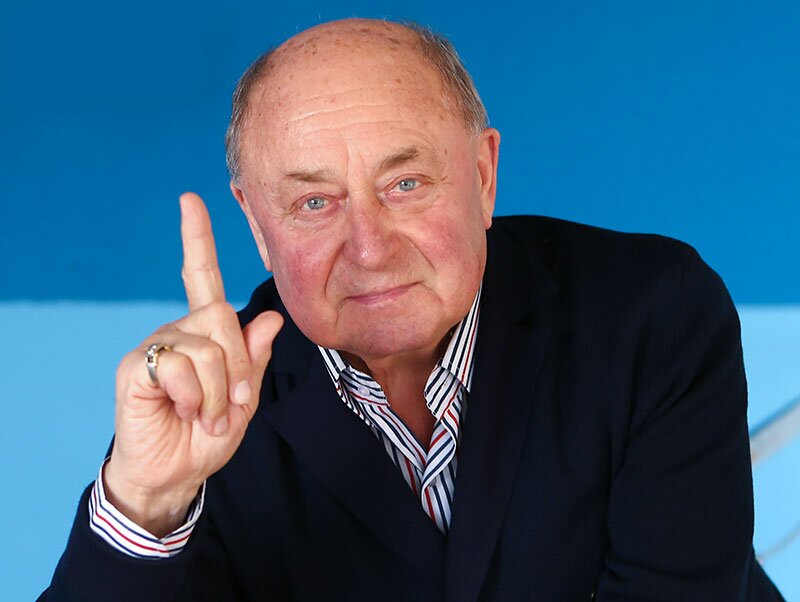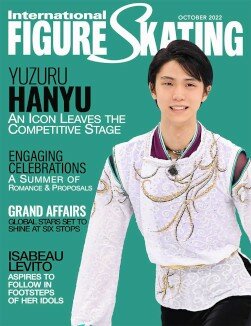
Over the past six decades, renowned Russian coach Alexei Mishin has witnessed —and been a part of — the evolution of figure skating. His contributions to the sport are legendary and, at age 79, he remains as invested as he was 60 years ago.
Throughout his long career, Alexei Mishin has built a résumé that includes Olympic, World, European and national champions, and a list of medalists that is too long to recount.
Mishin’s parents, who both skated recreationally, first introduced him to the sport at age 15. He recalled a winter when his father mounted blades on normal shoes so he could go skating but instead he and his friends took to sliding down the street while hanging on to the back of a truck. This, among other shenanigans, encouraged his parents to send him to skating classes to keep him off the streets.
Despite having a late start in the sport, he finished third in singles at the 1964 Soviet Championships. Two years later, he switched to pairs. Partnered with Tamara Bratus (Moskvina), the duo claimed two European medals — silver in 1968 and bronze the following year. With just two years of experience the duo, both aged 24, were sent to the 1968 Olympic Winter Games in Grenoble, where they finished fifth. They closed out their career with a second- place finish at the 1969 World Championships. Mishin and Moskvina both retired and turned to coaching.
Though Mishin’s breakthrough as a coach on the international stage came with the 1994 Olympic victory of Alexei Urmanov, he first found success two decades earlier. In the early 1970s, one of Leningrad’s (now St. Petersburg) rising stars Tatiana Oleneva was sent to Moscow to train with Viktor Kudriavtsev. When she returned to St. Petersburg, she began working with Mishin. In 1973, four years after his coaching career began, Oleneva captured the national title. Behind the scenes, a romance was blooming between coach and student and they married in 1967. The couple, who have two sons — Andrei, now 43, and Nikolai, 37 — would later join forces and become one of the world’s most successful coaching teams.
Mishin’s career as a skating instructor began under the watchful eye of his former coach, the late Igor Moskvin, who was the head trainer at the rink where Mishin worked. He recalled that in the early days, “Igor sent only the weakest students to me.”
However, it was not long before skaters started to take notice of the young, energetic coach who was experimenting with new and innovative approaches. After watching circus performers rehearse, Mishin decided to develop a harness for jump training. “When people saw them for the first time I was a laughing stock. ‘Look, Mishin has skaters swinging from ropes. He’s gone mad,’” he recalled. “But now these harnesses are hanging in all the skating rinks in the world.”
One of his first students was Juri Ovchinnikov who moved to train with Mishin at the behest of his wife. “Sometimes the wives of skaters brought them to me. I have only the brightest, fondest memories of my early students,” he said.
In 1975, Ovchinnikov became Mishin’s first international success story when he claimed the bronze medal at the European Championships. Four years later, another student, Vitali Egorov, became the first Soviet man to win a World Junior title.
Following on the heels of Urmanov’s Olympic victory in 1994, Mishin enjoyed a long run of success that began with Alexei Yagudin winning the 1998 World and European titles. Evgeni Plushenko — who would go on to become one of the world’s most decorated skaters — came next, winning three World and seven European titles, and four medals at four Olympic Winter Games, including the 2006 Olympic crown. The success story continued for Mishin when, in 2015, Elizaveta Tuktamysheva claimed the World title and four years later Sofia Samodurova became the European champion.
Along the way, Mishin became a professor at the Lesgaft National State University of Physical Education Sport and Health in St. Petersburg, where he researched the biomechanical and physical foundations of figure skating, wrote several scientific books, and developed exercises and training equipment that are used worldwide today.
From the very beginning, he focused on the development of jumps and jumping technique. In time, his methods, exercises for rotation and training tools became of interest to the rest of the skating world. In his recently published autobiography “The Secrets of the Ice, ”Mishin recounted his childhood in a post-war world. Born into a family of teachers in 1941 in Sevastopol, Crimea, just a few months before the German invasion of the Soviet Union, Mishin recalled that when his father once returned on furlough with chocolate, he did not even know what it was. After the war, the family moved to Tbilisi, Georgia, and eventually to St. Petersburg.
In 1972, Mishin and Sergei Chetverukhin, one of the top Soviet skaters at the time, made their first trip to the U.S. to visit famed Italian coach Carlo Fassi. That would ultimately be Mishin’s only trip to the West for many years. Shortly after returning home, he was advised that he was henceforth forbidden to leave the Soviet Union for any reason. According to Mishin, Soviet officials were made aware of his free spirit and were afraid he would defect.
“Success came quickly, but then some of my dear colleagues wrote a letter that I was planning to defect to the West. That was a down time. It was hard, but my students did not leave me,” Mishin recalled. “Ovchinnikov went to the 1976 Winter Games without me. Maybe that was one of the reasons he did worse in Innsbruck than he should have done. He finished eighth.”
MODERN APPROACH
Decades later, Mishin is once again finding his freedom compromised — albeit for a very different reason this time. But despite not being able to travel far from his homeland, he has not let the COVID-19 pandemic get in the way of progress. Having lived through many different eras in his 79 years, he views the current situation in the world as nothing more than a “moment.”
“Do you know the lyrics from a famous Soviet song: ‘There is only a moment between past and future and this is what is called life?’ This is how life goes by, moment by moment,” he mused. “I’ve been in figure skating for 64 years and during this time a lot has changed. Figure skating, like life in general, is subject to change. To me, the situation with the coronavirus influenced the sport to a lesser extent than the elimination of figures or the introduction of the new judging system.
“However, I think you can compare the coronavirus to these two events. It is a tremor, like an earthquake with a certain magnitude on the Richter scale. But, as with the elimination of figures, the new judging system has passed and this will also pass.
“Other coaches might complain, but I am continuing to work just as I did before. It is interesting for me to organize the training process under non-standard and non-traditional conditions. A number of experts said that the athletes will not be able to jump after the quarantine, but they started to jump at the first practice, and at the 10th practice the work was back to normal. You need to find something positive in everything.
“For example, how does life normally continue at the end of the season? Everyone quickly travels to shows, then takes a rest and then goes somewhere else, either to learn new elements, get new programs or new costumes. We have been running somewhere all the time, like horses with blinders. The confinement and the fact that it was not possible to prepare for the season in the usual rhythm, allowed the skaters to think, to take the blinders off and look around.
“When I now look at programs and the ideas and thoughts that coaches came up with — not only in my group but also in others — I have come to the conclusion that this break allowed the coaches and skaters to look at many things in new ways: New ideas, new thoughts, and a new approach to training emerged.” Despite the uncertainty about which competitions will take place and what to prepare for, Mishin said this does not affect the training schedule.
“The thing is, high-level athletes are so used to training. I did not notice in my own — or in others — that they had lost interest in working because of the changes in the competition calendar. “I allow myself to use the example of the old circus horse that stands in the wings and is not performing anymore, but when it hears the march in the arena, it starts moving its head in the tack. This is not a rude comparison, but a compliment to the people who are committed to our sport and love not just victories, money and fame, but figure skating itself.”
Notwithstanding his age, Mishin remains young at heart and is open to new and innovative ideas and concepts. When Tuktamysheva and choreographer Yuri Smekalov came to him with their idea to design a new long program live on Instagram with fans watching what they were doing, he did not hesitate to agree. Mishin’s relationship with the choreographer began many years ago when, as a young ballet dancer, he invited him to work with Plushenko.
“The significance of Yuri in the world of ballet and dramatic arts goes far beyond his status as a ballet dancer and soloist at the Mariinsky and Eifman Theatres,” Mishin explained. “The project to make a program with Lisa with viewers participating was a success. I also helped an American skater online to do a program. This form of work is very interesting, productive and useful and because the skaters and the choreographers are so professional, they can work this way. It is something else that we can be grateful for — the current situation has pushed the development of online choreography and practice and has thus broadened the possibilities for coaches and choreographers.”
Mishin and his wife, Tatiana Mishina, along with his assistant coach and choreographer Tatiana Prokofieva, currently work with Mikhail Kolyada, Tuktamysheva, Samodurova, Andrei Lazukin, Anastasiia Guliakova, Evgeni Semenenko and Gleb Lutfullin. “Here, I want to say something about my relationship with my students. Many coaches say that they have prepared a number of World, national, local and regional champions,” Mishin said.
“When I remember my students, I say thank you to Urmanov that he helped me to become the coach of an Olympic champion. Also to Yagudin, who allowed me to become the coach of a World champion. And thank you to Plushenko, Tuktamysheva, and Artur Gachinski for their talent and hard work that helped me become a better coach. The gratitude is better inside and not expressed by waving hands in the air, hugs and passionate kisses in front of a camera like the general secretaries in Soviet times.”
Mishin is especially proud of Tuktamysheva who, like himself, has forged ahead despite the odds. “You have to say thank you to Lisa. She is now a significant person in the world of figure skating. She is the guiding star for a lot of girls who left childhood behind them, who became young ladies and want to continue skating,” he said. “She is an example of someone who can skate well who is not a child.”
The most recent and somewhat surprising addition to Mishin’s stable is Kolyada, who made the coaching change in June. “As a coach, I have a difficult task, but the situation is not new for me. I went through this with Plushenko when he made his comebacks in 2010 and 2014, and also with Carolina Kostner,” Mishin explained. “I also had this same experience with Gachinski, but it was unsuccessful. With Tuktamysheva, there was a time when she placed like 10th and basically was unable to skate. My experience has taught me not to rush.
“At this moment, I am seeing the project Misha Kolyada for two seasons — this one and the next. Right now, I see my task in making some corrections to his jump technique. There are some details in his habits that cause him to open jumps early. In my whole career as a coach, when I took on an athlete I never promised medals, I just promised my work. We will see what comes out of it. This is a challenge for me. I can say that the appearance of Kolyada in my group has in some way increased my interest in the practice sessions. This interest has rejuvenated me.”
Aside from coaching a group of high-level skaters, Mishin continues his work as a professor at the university and continues to publish books. “People tell me that I energize them,” he said with a laugh. “There was a time when my wife and I were in a pessimistic mood, but six years ago when our grandchild, Alexei Mishin Jr., was born he gave us so much power. His appearance in our lives was like a ray of light and he has a healthy influence on us. We tried to teach him figure skating, but he is not interested. His parents were good tennis players and he is now also playing tennis.”
When asked what he considers the happiest moment in his long career to date, Mishin replied: “That moment has not yet come. Maybe it will, when I am at the end of this career.” Likewise, he could not cite his biggest disappointment. “Probably I have not had any major disappointments, but I will mention that Tuktamysheva did not yet get to go to the Olympic Games.”
Although he will turn 80 in March, Mishin, who was inducted into the World Figure Skating Hall of Fame in 2017, said he has no thoughts of retirement. “My plan is simple: Wake up in the morning and feel good. Jump in the car, drive to the rink, delve into the programs, the jumps and spins, the successes and failures of my students; go to competitions; read dissertations and write another chapter of my memoirs.
“In the words of my father, who lived to age 95: ‘There are no old people, only long-living people.’
Ed. Note: We are currently working on the English translation of Alexei Mishin′s autobiography, which is scheduled for release as an e-Book in April 2021.
UPCOMING COMPETITIONS:
2021 WORLD CHAMPIONSHIPS
2021 WORLD TEAM TROPHY





